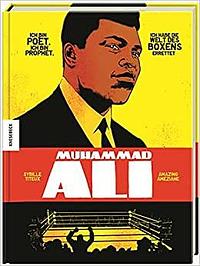You need to sign in or sign up before continuing.
Take a photo of a barcode or cover
I was surprised by how much I enjoyed this biography. I'm not usually much of a graphic novel reader (I've been practicing, though). Usually, I find the balance between text and images to be confusing, but in this book, the images really did enhance the story. From the inside cover's list of characters with mini-biographies to the exerpts from newspapers and TV interviews, the images really helped to tell the story and connect various pieces together.
In some ways, I think this is a far more accessible story of the history of civil rights than the graphic novel March is. While Titeux does not shy away from introducing numerous historical figures, somehow they stay distinct and never slip into a pool of confused/confusing names. It helps that the book contains the biographical reference in the beginning of the book, but I never needed to use it.
I love how African American history provides a supporting structure for the story of Ali's life. He was instrumental in so many parts of the movement for black power.
My main complaint is probably that at times the book was a bit sycophantic. Obviously Ali was an important historical figure, but the dismissal of his treatment of his first wife as he divorced her to get together with Veronica, who "soon falls for you. Who wouldn't want to be wrapped up in your gentleness, your kindness, and all the rest that sets you apart?" Well, gee, Betty, maybe? Or perhaps she'd've been OK sharing? IDK.
This is offset by the powerful historical recountings like that of the year 1968, which includes Vietnam, Stokely Carmichael, the assassination of MLK, Robert Kennedy's run for president and the protest of John Carlos and Tommie Smith at the Olympics. These aren't isolated moments in time, however. While their most historic moments happened that year, Titeux also lets us know how those situations resolved over time, compacting years into a cohesive whole with a shared moment of visibility in 1968.
I was struck by how much of boxing history (of which I was completely ignorant) was re-tooled to create plotlines for the Rocky franchise. Who knew? Well, probably anyone who knows anything about famous boxing matches, I guess...
The author does hint at the broken relationships Ali leaves in his wake: Malcolm X and Joe Frazier come to mind. But predominantly the story is one that echoes the praise of many who knew him during his lifetime.
Anyway, this book goes beyond merely telling about an important person's life. It's an extremely effective way to tell history. The narrative arc of the story itself is a page-turner, and the author leaves a lasting theme of resistance by including an image of a young person with a raised fist as he wears a t-shirt that reads "Trayvon Martin."
In some ways, I think this is a far more accessible story of the history of civil rights than the graphic novel March is. While Titeux does not shy away from introducing numerous historical figures, somehow they stay distinct and never slip into a pool of confused/confusing names. It helps that the book contains the biographical reference in the beginning of the book, but I never needed to use it.
I love how African American history provides a supporting structure for the story of Ali's life. He was instrumental in so many parts of the movement for black power.
My main complaint is probably that at times the book was a bit sycophantic. Obviously Ali was an important historical figure, but the dismissal of his treatment of his first wife as he divorced her to get together with Veronica, who "soon falls for you. Who wouldn't want to be wrapped up in your gentleness, your kindness, and all the rest that sets you apart?" Well, gee, Betty, maybe? Or perhaps she'd've been OK sharing? IDK.
This is offset by the powerful historical recountings like that of the year 1968, which includes Vietnam, Stokely Carmichael, the assassination of MLK, Robert Kennedy's run for president and the protest of John Carlos and Tommie Smith at the Olympics. These aren't isolated moments in time, however. While their most historic moments happened that year, Titeux also lets us know how those situations resolved over time, compacting years into a cohesive whole with a shared moment of visibility in 1968.
I was struck by how much of boxing history (of which I was completely ignorant) was re-tooled to create plotlines for the Rocky franchise. Who knew? Well, probably anyone who knows anything about famous boxing matches, I guess...
The author does hint at the broken relationships Ali leaves in his wake: Malcolm X and Joe Frazier come to mind. But predominantly the story is one that echoes the praise of many who knew him during his lifetime.
Anyway, this book goes beyond merely telling about an important person's life. It's an extremely effective way to tell history. The narrative arc of the story itself is a page-turner, and the author leaves a lasting theme of resistance by including an image of a young person with a raised fist as he wears a t-shirt that reads "Trayvon Martin."
